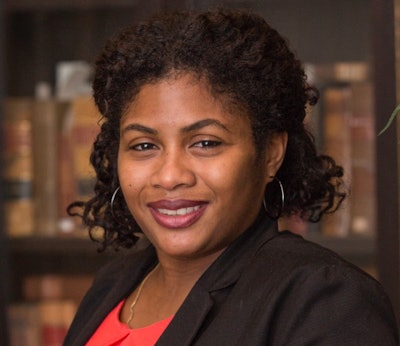 Kristen M. Guiseppi
Kristen M. GuiseppiKristen M. Guiseppi brings seven years of experience in student support services to the University of Houston Law Center (UHLC), where she is program manager of the Pre-Law Pipeline Program.
Having previously coordinated the pipeline program at the Ronald H. Brown Center of Civil Rights and Economic Development at St. John’s University School of Law in New York, Guiseppi is helping the UHLC program make strides in its third year. Under her leadership, the award-winning program has strategically prepared students from underrepresented groups for law school and the legal profession.
This leadership was built on the Trinidad and Tobago native’s experience after she had to adapt to a new style of teaching, learning and studying for college in the United States.
“When I first came to the U.S. for college, everything was different from what I was used to: the culture, the mannerisms, the expectations,” Guiseppi said. “I had to put in a lot of time figuring out the nuances of attending an American university. Many of the struggles that my students currently face, I myself have faced.”
Guiseppi’s understanding of many of her students’ obstacles, in addition to her work at the Ron Brown Center, allowed her to hit the ground running when she arrived in Houston. Because the law center did not have a “pipeline” program per se, she immediately began working diligently – speaking on panels, recruiting at fairs and speaking to pre-law groups – to establish a reputable program that would attract students.
As importantly, she had to build a new set of relationships with UHLC’s faculty and staff, the Houston area firms, attorneys and judges, and the community at large as she knew they would play critical roles in the success of the pipeline program for student internships, introductory law courses, workshops and mentoring opportunities.
“I had a lot of support from the University of Houston, the University of Houston Law Center, and the legal community that I think made it a lot easier when I was trying to build this program from scratch,” Guiseppi said.
She included programs and sessions for her pipeline students focused on skills that attorneys, law faculty members and current law students told her they wished they had learned during their time in school. “This way,” she said, students “will be prepared well in advance of their law school years and they have an idea as to what to expect when they get into law school.”
Each year, students in Guiseppi’s Pre-Law Pipeline Program participate in LSAT prep, legal writing sessions, Socratic seminars and introductory law classes taught by UHLC law faculty and other academic and professional-development opportunities designed to make them competent in law school and the legal profession. She has worked on collaborative diversity events such as the National Black and Hispanic Pre-Law Conference and Discover Law Day, which were held at UHLC.
Guiseppi emphasizes the importance of professional development for pre-law students by including programming on networking, business lunch etiquette, social media etiquette, having a LinkedIn page and how to dress for success in the profession, for example.
Students also take practice law school exams and work on strengthening their resumes, personal and diversity statements and overall law school admissions profile.
“I have a peak-performance counselor who helps students get over some barriers that they may have and gets them to unlock their keys to success,” Guiseppi said. “It’s all about teaching them to trust in themselves. I know that they already have the skills for success. They just need to utilize them.”
Guiseppi said she takes a “holistic approach” to preparing her students for the demands of law school and the legal profession because it is a critical journey on which students must be resilient and confident. “There is no room for self-doubt.”
“I promote school-life balance, the importance of self-care, the importance of exercising and mental health, along with the rigorous academic curriculum that we have to improve their law school admissions profile,” she said. “Through all of these things, I’m hoping to shape them mentally, physically and emotionally to be prepared for law school.”
To date, Guiseppi has nine students in their first year of law school and two students completing their second year. She said the results are “impressive” for a three-year-old program, and she expects to increase those numbers over the next few years.
The program has received grant funding and a number of awards, signaling to Guiseppi that “we’re heading in the right direction.” The Pre-Law Pipeline Program received a $300,000 grant from the Law School Admissions Council in December to continue efforts to diversify the legal profession, as well as funding from UH’s provost office and AccessLex Institute. It also won the UH System Board of Regents’ Academic Excellence Award for exemplifying “excellence in teaching, research and/or public service.”
Students who go on to complete the program stay in touch with Guiseppi, sending cards, graduation pictures or thank-you emails. Some drop in for a surprise visit and some stay connected with her and their fellow program participants on social media.
“I’m always happy when I look on social media and I see [students] communicating with each other, because those relationships that they’ve developed were because of the program,” she said.
“And that in itself is very inspiring,” she added, because she urges students to view each other not as “competition, but moreso as like-minded peers or colleagues working towards the same goal.”
Tiffany Pennamon can be reached at [email protected]. You can follow her on Twitter @tiffanypennamon.





















